Provincetown Historic District
The Provincetown Historic District encompasses most of the dense urban center of Provincetown, Massachusetts. The district is roughly bounded to the north by U.S. Route 6; to the west by the west end of Commercial St.; to the south by Provincetown Harbor; and to the east by the southeast end of Commercial St. It covers about 300 acres (120 ha), and includes more than 1,000 buildings. Its historic character spans more than 200 years of settlement, from the city's early years as a fishing community, to its development as a summer resort area and artists' colony beginning in the late 19th century.[2] The district was listed in the National Register of Historic Places in 1989.[1] Four properties in the district are also individually listed.
Provincetown Historic District | |
 First Universalist Church (photo taken in 2007) | |
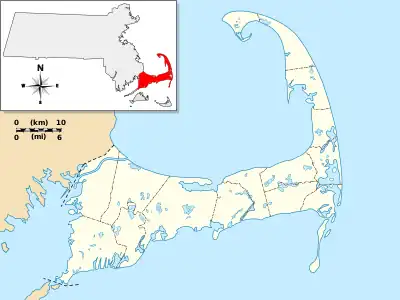 | |
| Location | Provincetown, Massachusetts |
|---|---|
| Coordinates | 42°3′2″N 70°11′13″W |
| Area | 300 acres (120 ha) |
| Architectural style | Mid 19th Century Revival, Georgian, Federal |
| NRHP reference No. | 89001148[1] |
| Added to NRHP | August 30, 1989 |
First Universalist Church
The First Universalist Church, built in 1847, is the oldest church in Provincetown. Its "Christopher Wren" tower is thought to have been inspired by the famous English architect. It is now called the Unitarian Universalist Meeting House.
Center Methodist Church (former)
The Center Methodist Church church building is the current home of the Provincetown Public Library and former home of the town Heritage Museum.
Provincetown Public Library (former)
The former Provincetown Public Library building remained on the National Register after the library moved in 2005 to the Center Methodist Church, above.
Provincetown Post Office
The Provincetown Post Office Building on Commercial Street, still the town's only post office, was built in 1930. It is a brick two-story building with a loggia of three rounded arches.
Gallery
 1910 postcard presenting the heart of the district and of the town.
1910 postcard presenting the heart of the district and of the town.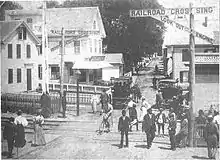 Commercial Street in the 1890s. At that time, MacMillan Pier was called Railroad Wharf.
Commercial Street in the 1890s. At that time, MacMillan Pier was called Railroad Wharf.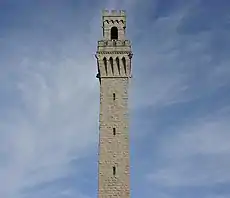 The Pilgrim Monument, designed by Willard T. Sears after the Torre del Mangia in Siena, Italy; built 1907–1910.
The Pilgrim Monument, designed by Willard T. Sears after the Torre del Mangia in Siena, Italy; built 1907–1910. Postcard of the 1907 ceremony for the laying of the Pilgrim Monument cornerstone, with Theodore Roosevelt.
Postcard of the 1907 ceremony for the laying of the Pilgrim Monument cornerstone, with Theodore Roosevelt. 1910 postcard of the First Universalist Church
1910 postcard of the First Universalist Church First Universalist Church's tower
First Universalist Church's tower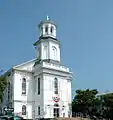 The former Center Methodist Church building in 2007
The former Center Methodist Church building in 2007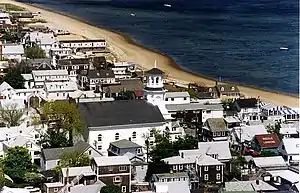 The Center Methodist Church is the most prominent building in this part of Provincetown center.
The Center Methodist Church is the most prominent building in this part of Provincetown center. Interior of the former Center Methodist Church, remodeled to incorporate a half-scale replica of the Rose Dorothea.
Interior of the former Center Methodist Church, remodeled to incorporate a half-scale replica of the Rose Dorothea.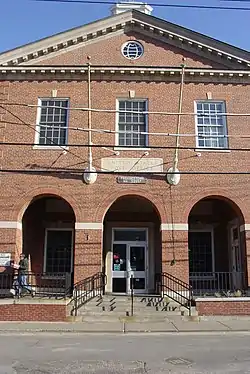 Provincetown Post Office
Provincetown Post Office
References
- "National Register Information System". National Register of Historic Places. National Park Service. January 23, 2007.
- "NRHP nomination for Provincetown Historic District". Commonwealth of Massachusetts. Retrieved 2015-07-20.
